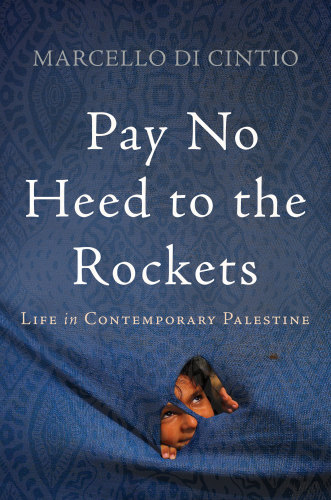
Pay No Heed to the Rockets
Life in Contemporary Palestine
- اطلاعات
- نقد و بررسی
- دیدگاه کاربران
نقد و بررسی

July 15, 2018
A noted Canadian nonfiction writer examines the Palestinian conflict through the viewpoints of known and emerging Palestinian writers.Di Cintio (Walls: Travels Along the Barricades, 2013, etc.) first traveled to Israel in 1999. When he returned again in 2015, it was to seek out Palestine writers to learn how they, rather than activists and politicians, saw the Arab-Israeli conflict. In this literary travelogue, the author records his encounters with Arab writers from the West Bank, Jerusalem, and the Gaza Strip. His first meeting was with a childhood friend of Palestinian national poet Mahmoud Darwish. Both lived through the takeover of their village by Israeli soldiers in 1948, a moment that would mark Darwish and his writing forever. Fascinated by the lively literary scene in the West Bank city of Ramallah, Darwish's home-in-exile for many years, Di Cintio explored the perspectives of other notable West Bank writers, including Lebanese-born Maya Abu-Alhayyat, who grew up knowing Palestine only "from what I saw on television." A poet and short story writer, she eventually began writing for the most vulnerable of all Palestinians: children robbed of their innocence by parents and teachers who "want[ed] them to behave like adults and participate in the struggle." In Jerusalem, Di Cintio met writers like 20-year-old Mohammed El-Kurd, whose poetry not only celebrated the contributions of women to the Palestinian struggle, but also actively "challenge[d] Palestinian masculine ideals." Traveling to Nazareth, Di Cintio encountered Raji Bathish, a gay short story writer who vehemently rejected the idea that Israel's accommodation of LGBTQ people was "evidence of [its] humanitarian virtue." In the Gaza Strip, Di Cintio chatted with yet another outspoken young writer, Asmaa al-Ghul, whose stories about " 'honor killings, ' domestic abuse and government corruption have earned her scorn from Gaza's authorities and an enduring notoriety from readers." Interweaving history and politics, the book introduces Western readers to the modern Palestinian literary scene while celebrating the rich diversity of voices that comprise it.Illuminating reading from a highly engaged author.
COPYRIGHT(2018) Kirkus Reviews, ALL RIGHTS RESERVED.

Starred review from August 13, 2018
Di Cintio (Walls: Travels Along the Barricades) offers a powerful and perceptive reflection on Palestinian culture in a memoir that mixes travelogue and literary appreciation. He is surprised to travel through Israel and the occupied territories and discover so many “brokers of beauty”: poets, playwrights, and novelists producing stories of growing up, falling in love, disapproving parents, having conflicts over religion, and breaking rigid gender roles. Di Cintio writes, “The women of Gaza write themselves a life on the page that Gaza itself denies them.” Di Cintio also explores the works of Palestinian poet Mahmoud Darwish and dives into café culture, interviewing a new generation of writers who discuss over coffee and shisha, or hookah, their nuanced feelings about occupation, cross-generational trauma, the burdens of history, and their insistence on writing works that privilege storytelling over revolutionary rhetoric. Di Cintio’s prose is wonderfully descriptive, whether portraying libraries and bookstores dedicated to preserving and promoting a cultural history threatened with elimination or recounting stories of novels being written in prison on cigarette wrappers. This is a refreshing and hopeful reminder that on both sides of the Israeli-Palestinian conflict are countless people who wish to live their lives free of the hatred borne of geopolitical conflict. Agent: Jackie Kaiser, Westwood Creative Artists.

Starred review from August 1, 2018
One of the great tragedies of Palestine is how little most outsiders know of everyday Palestinians. Journalist Di Cintio narrows this gap by recounting his nearly 20 years of visits to the West Bank and Gaza, weaving conversations around the writings of Palestine's many literary figures: national poet Mahmoud Darwish, who once performed to a soccer stadium full of fans; martyred revolutionary Ghassan Kanafani; and romantic novelist Gharib Asqalani. Literature, history, and politics inevitably intertwine, as the pain and rage over lost villages and lost freedom inform everything from erotic poetry to a student literary salon. In Maya Abu-Alhayyat's children's story, a boy prays in vain for his missing father, imprisoned in Israel, to return. During the 2014 Israeli bombing of Gaza, Najlaa Ataallah imagines a wistful teen lover: After surviving each aggression you always make a promise to yourself. The promise that if you were to stay alive you will live and embrace life with more joy than ever before. You will tell the carefree girl in your neighborhood . . . that you really admire her. . . . You feel this love exploding inside you as did the explosions that took all the houses in the air strikes. A timely and exquisite book.(Reprinted with permission of Booklist, copyright 2018, American Library Association.)




دیدگاه کاربران